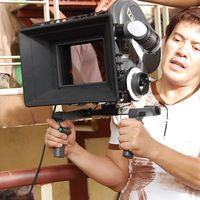Discussion With Director Tan Chui Mui On Her Experience At Résidence Du Festival Of Cinéfondation
This month, SEA-Images meets with Tan Chui Mui, a filmmaker from Malaysia, who recently moved to Paris to be a resident at Cinéfondation, the residence programme of the Cannes festival. She has directed many short films which have been shown in international film festivals. In 2006, she received the New Current Award and the Fipresci Award at the Pusan International Film Festival with her debut feature film Love Conquers All.
Can you tell us about your backgrounds as a filmmaker?
In my university, I studied computer animation. In fact, the course is called film and animation, but some main courses are only computer animation. And then I was teaching, tutoring in the same school. I graduated in 2001, and in 2002, I met directors Amir Muhammad and James Lee in a screening. Then, I thought it would be more interesting for the students to know these people who were making films, films with a really low budget. I found it quite motivating. So I persuaded the school to have weekly screenings. We have a very nice cinema at the school, called multimedia school, an impressive cinema. After 5 screenings, the students didn’t come any more. They were forced to come because I made the class compulsory. In the end, I was the one who got motivated and made my own short films. So the first film I worked on was Big Durian directed by Amir and produced by James. James asked me to work in the second camera unit. Woo Ming Jing was the first camera unit. We shot this documentary in 7 days, and in the end, they did not use my footage at all. They used only street scenes, and for all the interviews, we used two cameras. And the footage of the second camera was not used at all. In between, I made my own short films. And for some of the films that James, he asked me to edit them because I was the cheapest. So I was involved in several productions, and we still work together in each other’s projects.
In the school, we had video classes, so I had made documentaries before. And I started making short films with some of my friends of the college. But mostly, I made my films by myself because I kept shooting visuals and putting a voice-over narration until Tree in Tanjung Malim, which I made with some actors and proper dialogues. This time, no more voice over. But it was more like an exercise. I think this is my first short film that was invited to different film festivals – in Rotterdam, Oberhausen, also in Belfort. And then I made a few more short films. Finally I made my debut feature in 2006.
What brings you to Paris?
I’m in Paris for Cinéfondation. I just applied for it when I didn’t even have a concrete project. We’re very used to applying for grants and supports.
I applied for it once last year, for the session where Raya Martin (a filmmaker from the Philippines) was. I wasn’t accepted, but when I was in Locarno where I met Georges (the director of Cinéfondation), he came to see me and advised to apply for it again. He knew that I had applied for it before, but apparently, they didn’t like my previous project. So I came with a new project.
I’m not sure why they chose my project, but now, I’m just enjoying Paris.
Can you tell us what you are doing at the Cinéfondation?
In fact, I’ve been here for only four weeks now. I go out very often because I have a very small room. No, I’m joking, it’s a very nice apartment. The area is very interesting, but I prefer to go out and I go to the Cinémathèque a lot although the films screened have only French subtitles. But I think I learn French a lot faster watching films with subtitles than with my French classes because you can see someone talking. I haven’t started writing yet, and I’m a bit nervous now. But I arrange meetings myself, so I meet distributors and other filmmakers in Paris. Mostly, they are my own meetings.
Do you have to finish your script during the session?
I think the ideal should be finishing the script because at the end of the session, they can translate it into French for free. So I should finish writing by July. But as far as I know, most of the residents cannot finish in time.
Do your residence mates have similar backgrounds as yours?
I’m not sure about the previous sessions. But I think some of my residence mates have made documentaries. Of course, we are from different countries, from Turkey, Iran, Georgia, Israel, Argentina, and me, from Malaysia. I think I’m the only one who has already made a feature film. I guess that most of them have a very strong experience in short films.
Do you guys get along well with one another?
So far, yes. This is still our honeymoon. We spend a lot of time together in the kitchen. I think all of us cook ourselves, and it takes time to cook and eat. So we talk a lot with each another. This is the first time that residents always gather together in the kitchen.
What language do you use?
Three of the residents speak French very well, but we communicate mostly in English.
Apart from the accommodation, transportation and translation, in what other ways does the Cinéfondation helps you?
I think they want to arrange meetings with producers and distributors, and also, help us with finding funds in France. And they would happily arrange meetings with other directors in Paris that we’d like to meet.
Which French directors would you like to meet?
I don’t think we could meet all the French directors that we’d love to meet. One of the girls at the residence used to say enthusiastically “Can we meet Godard?” Personally, I’d like to meet Bruno Dumont and Claire Denis. I already met Bruno Dumont in Pusan. But for me, it is not really necessary to meet them. Actually, when Georges asked us to make a list of the filmmakers that we would want to meet, I didn’t hand in any list.
Do you think there are any similarities between the Malaysian DV scene and the Chinese DV scene?
I only know Jia Zhang Ke’s group because I read some articles about them. But it is only this year that they want some exchange with Malaysian DV film. Jia Zhang Ke wants to show Malaysian DV films in China, and Chinese in Malaysia. And there are other people doing the same thing. It’s only this year that we’ve begun to try exchanges, and before, there was not really much connection between the two. We don’t really know each other.
The Chinese community in Malaysia is closer to Taiwan than to China. Cultural exchanges between China and Malaysia began as late as 1990s. Many Malaysians who were educated in the Chinese language, especially those in their 40s or 50s now, studied in Taiwan. So there’s quite a strong connection with Taiwan.
* Presentation of Cinéfondation’s residence programme:
The Résidence du Festival welcomes every year a dozen young directors who work there on their first or second fictional feature film project, in two sessions lasting four and a half months (from October 1st to mid February, and from the end of February to mid July).
Since its creation in 2000, the residence has welcomed more than seventy filmmakers from more than forty different countries.
It makes available to them a place of residence in the heart of Paris, a personalised programme accompanying the writing of their scripts, and a collective programme of forums with film industry professionals. Nearly fifty filmmakers emerging from the great halls of this "Villa Médicis" of cinema have seen their films selected by international festivals and distributed in theatres.
The residents equally benefit from:
* 800 euros per month for living expenses
* Free access to a large number of Parisian cinemas
* French lessons (optional)
* Possibility of attending festivals during their stay
The selection of the residents by a jury, presided by a director or a motion-picture celebrity, is based on the quality of their already made shorts - or first feature film, as well as on the interest of the feature film project in the course of being written, and on the candidates' motivation.
by Jérémy Segay
Similar content
By Kerrine Goh
05 Nov 2004
By Kerrine Goh
25 Nov 2005
By Kerrine Goh
12 Feb 2012
By Kerrine Goh
03 Jun 2005


